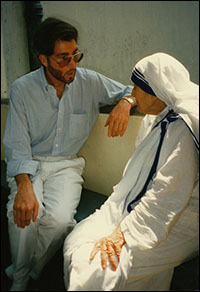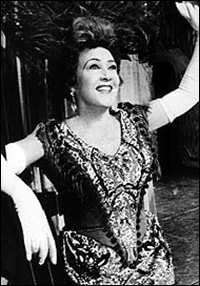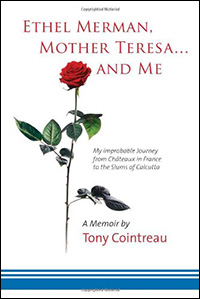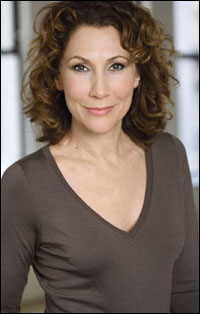
Tony Cointreau
In his new memoir "Ethel Merman, Mother Teresa . . . and Me: My Improbable Journey from Chateaux in France to the Slums of Calcutta," which was recently published by Prospecta Press, Tony Cointreau discusses his relationships with three very different women, all of whom he considered "other mothers." Those women included Lee Lehman, wife of Robert Lehman, head of Lehman Brothers; Mother Teresa, who was beatified by the Vatican in October 2003; and Ethel Merman, the Broadway star synonymous with the American Musical Theatre. Cointreau, a scion of the French liqueur family who later enjoyed a successful international singing career, grew up with an emotionally remote mother, which led him on a lifelong quest for love and for a mother figure. He would eventually find three, and his experiences with those aforementioned women are charted in his engaging new book. I recently had the pleasure of chatting with Cointreau, who spoke openly and lovingly about his relationship with the late Merman; that interview follows.
Question: How did the idea for this book come about?
Tony Cointreau: I had worked with Mother Teresa for 12 years with the dying. I started when the AIDS crisis started, and no one knew how it was transmitted or what to do about it, and everyone would be dead within a few months. It was a terrible period. Mother Teresa opened the first hospice for destitute men dying of AIDS in New York City. I had a singing career in Europe, and I came to New York and I saw a picture in Time Magazine of a man carrying a dying man in his arms in Calcutta, and I thought, “I have to do that.” So I called this place in New York, Gift of Love. Well, when Mother Teresa died, I started writing about my experiences there, because every day I had spoken into a tape recorder, and what happened was my agent said, “People want to know who you are.”
So I started, and I realized that I had these wonderful mothers who had healed the parts of me that had been so damaged as a child. And, of course, when I was 18 years old, I had met Ethel Merman. She was doing Gypsy. She was my second other mother and for 25 years of her life, we were joined at the hip. We spent every day on the phone — at least once to five times a day. And, I still, after she’s been gone now for 30 years, every morning at 10 o'clock, I still expect the phone to ring and hear, “Hi, it’s me!”
Question: When or how did the friendship change to being more with Ethel Merman than with her daughter, Little Ethel?
Tony Cointreau: Ethel Merman and I hit it off immediately. I was going to the Neighborhood Playhouse, where I was going for a class and where I met her daughter. And, I don’t know if you know the story or not, but we just hit it off — the two of us, the daughter and I. And, about a week later, she said to me, “Hey, do you want to go see Mom’s play?” And I said, “Yeah, what show is she doing?” And, she said, “Gypsy. ‘Mom’ is Ethel Merman.” So, I went to pick her up that Friday night to take her to see Gypsy, and we were going to go out to dinner first, and that’s where I met Ethel Merman, and we just hit it off so well that on Monday when I went to school, Little Ethel said to me, the first words out of her mouth, “If Mom can’t have you for me, she wants you for herself.”
And, Little Ethel went back to Colorado for college, and her mother and I never lost touch. And then, of course, Little Ethel died at the age of 25, in 1967, and then I became [Ethel Merman's] other son. She would call me that. And Bob [Levitt], her son, wrote a beautiful little blurb for my book, which explains a lot of what he saw between his mother and me. [He wrote], “Tony Cointreau’s friendship with my mother was one of her life’s true blessings. Naturally comfortable in the brightest light of her stardom and the softest light of her vulnerable heart, Tony shared an everyday intimacy with Ethel, like a second son… like my brother.” She was not the loud, broad, brassy dame that she portrayed onstage. She was vulnerable, she was shy, and she was very generous. You could never pick up a tab with her. She was very generous. There are so many distortions about her because of the stage persona. She could be terribly, terribly funny, and she knew her way around a four-letter word, yes. You know, when she said something, it was very funny. She was a great comedienne. In all of her shows, she was very funny. But if you see it written out, and you don’t hear her say it, it can sound not very attractive, and that’s too bad.
| |
 |
|
| Cointreau with Mother Theresa |
Tony Cointreau: We took her to Cats, and it was not her kind of show. And the thing that Ethel did to let you know how she felt about something — either to me or my partner Jimmy Russo, who was always on the other side of her — she would put her elbow in your rib, and we were both black and blue after that. [Laughs]. And I tell you, that was the worst. That was not her type of show. It’s funny because after that, we went to pick up Ann Miller, who was doing Sugar Babies. We were going out to supper, and we asked Ann Miller, “Have you seen Cats? Did you like it?” Ann Miller, and again it was so funny coming out of her mouth, she said, “Too much pussy!” [Laughs.]
When Raquel Welch took over for Lauren Bacall [in Woman of the Year], we went to see it with her, and Ethel absolutely adored Raquel and wrote her a fan letter. I’m sure Raquel was stunned. She was good. She was very good in it. And, Ethel just loved good theatre. We went down to Washington to see the preview of 42nd Street, a couple of friends of ours were in it, and Ethel was also really a good sport. And, coming back to New York, it was the middle of the summer, and it was hot as Hades, and the air conditioner went out in the car. It didn’t bother her at all. She just opened the window and went to sleep and woke up when we got to the Holland Tunnel. And, you know how noisy it is in the Holland Tunnel. Ethel decided that she would compete with the noise by singing “She’s Me Pal,” and I want you to know something, Andrew, she won.
Question: What was it like hearing her voice up close?
Tony Cointreau: I’ll tell you, she could sing very softly. We would go to restaurants, Jimmy, Ethel and I, and at the end of dinner in a crowded restaurant, I would say, “Ethel, very quietly so no one can hear, would you please sing your favorite song?” And she would sing, “The Lord's Prayer.” She was very spiritual, and she was wonderful with sick people. Every Wednesday she went to work at Roosevelt Hospital — she volunteered there. I just always told her to be very careful if she walked into the cardiac unit and said, “Hi I’m Ethel Merman!” A diehard fan is just going to keel over. [Laughs.]
Question: What shows did you get to see her in? What are your recollections of her as a performer?
Tony Cointreau: Well, the first time I ever saw her sing was on television in 1953, the Ford 50th Anniversary Television Show, and I fell in love. Then, of course, I saw her in Happy Hunting and thought she was fabulous. And then in Gypsy, and I saw it under the best of conditions. Her daughter and I went, and then afterward we went backstage. It’s funny, we went to Ethel Merman’s dressing room, and I was 18 years old, and I had forgotten [to use the bathroom], and I was walking in with my legs crossed, and I said, “Oh, Ms. Merman" — she was Ms. Merman to me then — "is there a toilet around here?” She said, “Oh yeah, honey, around the curtain there.” There was a curtain, and behind it was a sink and a toilet. I would rather have died at that age than have Ethel Merman hear me urinate! [Laughs.]
She was taking us to Sardi’s. We went to Sardi’s and met, of course, show-business heaven. She introduced me to everybody, and Billy Rose, the great producer, took us all and dropped us all off at our homes, our respective homes, in his gold Rolls-Royce, which wasn’t too shabby. But one night, though, when she was divorcing Bob Six and she was doing Gypsy, she was very sad. Little Ethel and I decided to go to the theatre, and we asked her if she wanted to go get a bite to kind of cheer her up. We arrived, and they were having curtain calls. And, everyone was there, the chorus and Jack Klugman and everything. I saw this little lady, she wasn’t very big, and she was looking down at the ground waiting for her turn to go onstage, and I saw the saddest woman you have ever seen in your life. She had this look on her face of complete devastation. But the moment it came time for her to step out on that stage and to take her bow, it was like every light from the show and on the Empire State Building lit up. It’s just that magic, that theatre magic that had enthralled audiences since 1930, was turned on like a switch.
| |
 |
|
| Merman in Hello, Dolly! |
Tony Cointreau: Oh, opening night of Hello, Dolly!? Oh my God! The audience went bananas. Now you know in Dolly, Dolly arrives on a trolley with a newspaper in front of her face. Well, when she lowered the newspaper and the audience saw Ethel Merman, it was pandemonium. They went completely bananas. And, you know what she told me later, she said, “You know? After 30 years on Broadway, that was the first time that I ever lost my concentration.” And, she’d had some ovations in her day, but that threw her. It really, really threw her. And then one of the greatest evenings in the theatre that I can remember, ever, was May 15, 1977, when she and Mary Martin did a concert benefit for the Museum of the City of New York, and they closed down part of Broadway; it was madness. But those two dames up there, the way it was staged by Donald Saddler, was so brilliant, and every time Ethel did a song, she just knocked everyone’s socks off. I thought the roof of the Broadway Theatre was gonna blow off. It was really exciting.
Question: She was friendly with Mary Martin, right?
Tony Cointreau: They were very good friends. When Ethel became ill, she was supposed to go and stay for a few days with Mary in California. Of course, she couldn’t, she didn’t, ultimately, but they were really good pals. You know, they didn’t step on each other’s toes either. I don’t see Mary doing Ethel’s shows or Ethel doing Mary’s shows. And Ethel always had one line when she was asked, because everyone tried to build a feud between them, and Ethel always said, “Oh, Mary’s okay if you like talent!”
Question: Did Merman talk much about her Broadway experiences with you? Did she talk about her decision not to do anymore stage shows after a certain point?
Tony Cointreau: After Gypsy she didn’t want to do it anymore. She’d been doing it for 40 years then. Then Hello, Dolly! came along, and Jerry Herman wrote the show for Ethel. The greatest disappointment of Jerry Herman’s life was when, and I got this from the horse’s mouth — there was Ethel and Jerry and David Merrick and Jimmy and me, and we were all sitting together and they recounted the story of when they, Jerry and David Merrick, called Ethel up, and said, “Ethel, we have your next show.” And she said, “Sorry, boys, I’m hangin’ it up.” And from then on, she did television shows, concerts with the symphony, and she loved everything she did. Everything she did was the most exciting thing – doing the “Love Boat” was as exciting to her as Gypsy. She was a little girl from Astoria, a secretary and a great star all at the same time.
Question: She left you a lot of memorabilia…
Tony Cointreau: I have it all, yes. Scripts. We even have her ashes, we have her daughter’s ashes, her mother’s ashes, her father’s ashes, and the father of her children’s ashes.
| |
 |
|
| Cover art |
Tony Cointreau: Yes, she did, with everything in it from recipes to her dental records with diagrams to what the dentist had told her, the diaries while she was doing Call Me Madam and Annie Get Your Gun. She put everything in there. She had another one in which she would find spiritual sayings, and she would paste them in that book.
Question: Little Ethel also had children. Do you know what happened to them?
Tony Cointreau: There’s Barbara Jean, who is off, I think, in Santa Fe. I sent Barbara Jean any of the family scrapbooks that I had, and then I hear she put everything on eBay. I didn’t see it, but I was told. And Michael, the grandson, no one knows where he is. Bob doesn’t know, his sister doesn’t know. He’s just gone somewhere. Now, somebody must know because he gets part of the residuals for things that are going on.
Question: Was there ever any talk about publishing some of her journals?
Tony Cointreau: What I feel is that these things really belong to her son, to Bob Levitt. I don’t have the right to publish anything. I’ve been in talks with him about these things — everything, the working scripts, everything, all of these things that we have — being put at the Lincoln Center Library. I think that would be a wonderful thing. And, I’m trying to get Bob on the ball with all of this, and it’s not easy. [Laughs.] Bob is kind of a hippie. And, I have something that will not see the light of day, but it’s her diary of her marriage to Ernest Borgnine. It’s a blank page in her biography. She did write a diary of it. Not a pretty picture. He played the game very well up until the marriage. Fooled me completely. I thought this was a love match, the sweetest guy, that he was wonderful, but boy the minute the vows were to be said, sweetness and light was over.
Question: What do you think was his motivation?
Tony Cointreau: I think he needed money. He was making money, not the money they make today on a TV show. Whatever his needs were, I think that played a big part in it. She was good with her money. Irving Katz did wonderful things with her money.
Question: In the book you talk about your three other mothers. Was there one you were particularly closest to?
Tony Cointreau: There is not. That’s the whole thing, and they all continued until their deaths. It wasn’t like one began and the other one started. It was a continuation. Ethel Merman and Lee Lehman knew each other, and they were friends. You know, when I went with [Lehman's] daughter [Pam] for six years, from 13 to 19, I was already a big fan [of Ethel Merman]. Bobby Lehman was on the board of directors for 20th Century Fox, and knowing that I was such a big fan, on our first date, for Pam and I, gave us their tickets to the formal world premiere of Irving Berlin’s "There’s No Business Like Show Business." I still have the tickets at the Roxy Theatre, and it was televised. At that time, to have a televised event, it was a big deal. I still have the tickets, in fact; they were never torn up. Question: Do you have one favorite memory of Merman? What stands out in your mind most?
Tony Cointreau: You know, that’s so hard. There were so many over 25 years. I would say sitting there listening to her sing "The Lord’s Prayer." That was magical. It was so soft.
| |
 |
|
| Randy Graff |
Tony winner Randy Graff paid glorious tribute to her native Brooklyn in her new cabaret show, aptly titled Made in Brooklyn, this past Wednesday evening at the Manhattan nightspot 54 Below.
Although much of the show spotlighted Brooklyn-born songwriters, Graff also spoke about the profound effect the borough's arguably-most-famous resident, Barbra Streisand, had on her life. In addition to a humorous recollection of the night Streisand came to see the original Broadway production of Les Miserables — in which Graff memorably created the role of Fantine — the actress also recalled how, as a 12-year-old girl in Brooklyn, Streisand's voice was the first to ever elicit goosebumps. Years later, Graff realized that it was not only the voice but Streisand's interpretation of songs that so affected her, the first to make her aware one could tell stories and share the ups and downs of life in song.
And, tell stories she does. In fact, as funny as Graff can be — her comic timing in song and story is impeccable — the singing actress can grab at the heart like few others. In her newest show, such moments sneak up on the audience: She draws laughs with a 60s medley that includes "One Fine Day," "This Magic Moment" and "Bossa Nova" and then pulls at the heartstrings with a belty and surprisingly moving "Breaking Up Is Hard to Do." Similarly, a compilation of Burt Bacharach and Hal David tunes, including "Close to You" and "I'll Never Fall in Love Again," are delivered with a humorous bent, and then Graff goes for the jugular with a terrifically touching "Alfie."
Other highlights of the evening, which featured musical director (and Graff's husband) Tim Weil on piano, included a haunting, beautifully sung version of the World War II anthem "I'll Be Seeing You"; an upbeat, humorous take on George and Ira Gershwin's "Somebody Loves Me"; the little-heard Marilyn and Alan Bergman gem "What Matters Most"; a heartfelt delivery of Marvin Hamlisch and Craig Carnelia's "That's How I Say Goodbye," a song cut from The Sweet Smell of Success; and the City of Angels classic "You Can Always Count on Me," which was a master class in song interpretation, flawlessly delivered with measured doses of comic sarcasm.
An encore of Jule Styne's "People" demonstrated one of Graff's true gifts, the ability to take a song one has heard dozens of times and make it completely new to the listener: The way she interpreted the Bob Merrill lyric was not only moving but completely spellbinding. Graff, it should be noted, is not a showy performer. She doesn't strut around the stage or gesticulate wildly. She simply stands, sings from her big heart and beguiles. Click here for calendar of artists at 54 Below.
Well, that's all for now. Happy diva-watching! E-mail questions or comments to [email protected].
*
Diva Talk runs every other week on Playbill.com. Senior editor Andrew Gans also pens the weekly columns Their Favorite Things and Stage Views.
[flipbook]


















